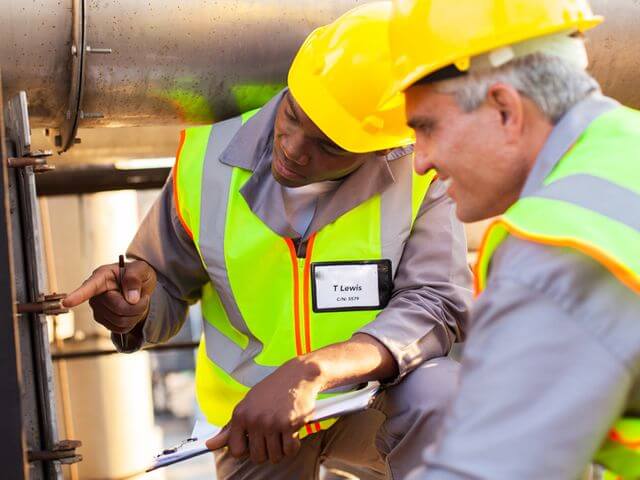Assessing Structures to Improve Asset Integrity
In a world first, Corrodere has introduced a Coating Survey Course endorsed by ICorr and accredited by Lloyd’s Register and the Royal Society of Chemistry. Written by industry experts and presented and examined online, this course will set the standard for those who conduct coating surveys as part of their responsibilities.
In this article, we answer two key questions about coating surveys – what are they, and why are they needed?
Why is a coating survey needed?
To apply an effective coatings solution that will protect a steel structure against corrosion, coatings applicators must understand two things:
- The environmental factors that affect the structure
- The condition of the existing coating on the structure to be protected
ISO 12944 is the internationally recognised standard that covers coatings for steel structures in atmospheric, immersed, and buried environments. However, without conducting a survey of the existing condition of the structure, any coating system that is applied risks falling short of its primary objective – to maximise the protection offered by the coating system, thus ensuring that safety hazards and operational interruptions are avoided.
The only way that it is possible to gain a proper understanding of the existing structure’s coating is by examining. Thus, the need for a coating condition survey.
A coating survey is essential not only prior to a new coating being applied. It may also be conducted as preparation for regular maintenance and inspections for structural or coatings failures.
What answers does a coating survey provide?
A coating survey is the foundation of a successful application of a protective coating system. It provides crucial information that will help determine what preparatory work is needed, the maintenance required, and which coating system should be used.
The survey should provide information that covers the following elements:
- The base material to which the coatings will be applied
- Existing coating system used and its condition
- If the existing coating material is hazardous
- Repair and remedial work required prior to application of the new coating system
The survey should help to address questions that include:
- Are there any special maintenance requirements needed, such as specialised removal of hazardous materials?
- What has caused existing degradation and deterioration of the structure (for example, damage, age, environment)?
- Is there any other maintenance and repair work required before protective coatings can be applied?
- What will be the most cost-effective coating application that can be applied to achieve the objectives?
The benefits of coating surveys
Unfortunately, in many cases companies rely on surveys that are based upon a walk-through and visual assessment of a structure. Such inspections trust the instinct and experience of those conducting the survey, instead of standardised testing, sampling, and analysis.
Applying protective coating systems is a major maintenance function. An effective survey will help to ensure that this maintenance achieves what it should – to safeguard the structure and protect employees and others from the disastrous consequences of poor corrosion protection in infrastructure and transport.
In short, effective coating surveys save lives, ensure the integrity of a structure, and reduce costs as well as potential loss and reputational damage caused by avoidable accidents because of corrosion.
To learn more about this groundbreaking coating survey course and the benefits it offers to companies, contractors, and employees, you should contact Corrodere. Alternatively, email the admin team at the Institute of Corrosion who will be happy to help.
In our next article, we describe an eight-step coating survey methodology that will ensure a survey delivers its expected outcomes.


